Le disjoncteur CA continue de déclencher le disjoncteur :9 coupeurs et solutions courants
AC déclencher le disjoncteur est ennuyeux. Encore plus gênant, essayer à plusieurs reprises de faire fonctionner un climatiseur qui ne cesse de déclencher le disjoncteur peut entraîner des dommages permanents dommages à l'unité AC. Donc, facile sur le bouton de réinitialisation du disjoncteur; vous devez d'abord diagnostiquer et résoudre le problème.
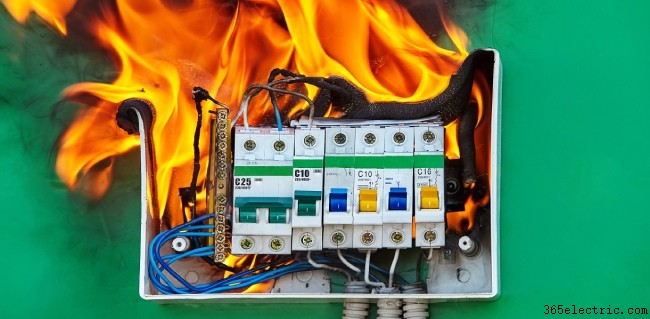
Voici ce qui pourrait se passer avec votre climatiseur :
- Le climatiseur déclenche le disjoncteur immédiatement . Lorsque vous allumez l'unité AC, le disjoncteur bascule immédiatement ou seulement après quelques secondes.
- Le courant alternatif déclenche le disjoncteur après 5 minutes ou alors. Le courant alternatif démarre bien, mais après quelques minutes, le disjoncteur se déclenchera. Ceci, par exemple, est typique pour le disjoncteur de déclenchement du compresseur AC (disjoncteur de déclenchement de l'unité AC extérieure).
- Le disjoncteur se déclenche après quelques heures . Un climatiseur fonctionnera bien pendant plusieurs heures avant de déclencher le disjoncteur.
Pour aider tout le monde, nous allons voir comment vérifier pourquoi l'unité AC continue de déclencher le disjoncteur. Nous allons rechercher 9 principaux coupables qui provoquent le déclenchement continu du disjoncteur AC.
Il n'y a que deux raisons pour lesquelles votre AC continue de se déclencher :
- Vous avez un disjoncteur défectueux . Cela implique des problèmes de disjoncteur, de câblage CA et de courts-circuits électriques.
- Vous avez un climatiseur défectueux . Cela implique des problèmes avec le compresseur AC, l'unité de condenseur, les condensateurs, les filtres à air, le moteur du ventilateur, les faibles niveaux de réfrigérant et même l'unité AC gelée. La cause principale est la surchauffe du courant alternatif due à un débit d'air limité ou à une pièce défectueuse.
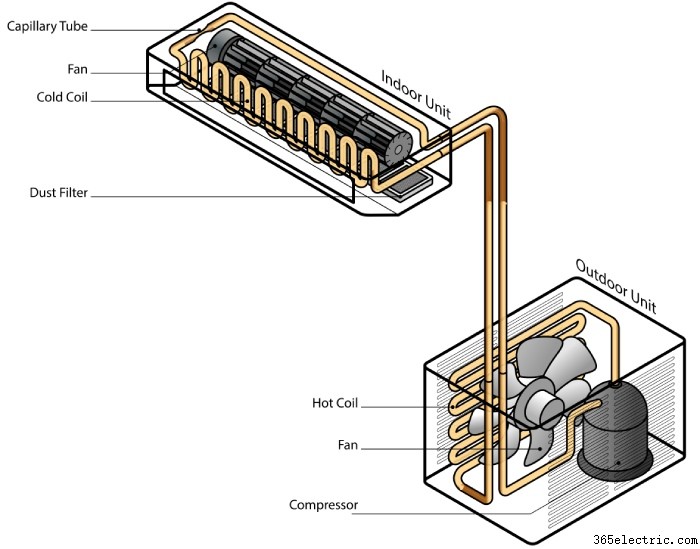
Comme tout professionnel du CVC, vous devez vérifier ces coupables un par un, en éliminant les causes au fur et à mesure. Une fois que vous avez correctement détecté la cause du déclenchement continu du disjoncteur AC et résolu le problème, votre unité AC devrait à nouveau fonctionner correctement.
Remarque : Pour chaque coupable, nous allons vous dire si cela provoque le déclenchement du disjoncteur AC immédiatement, après quelques minutes ou après quelques heures, et vous expliquer pourquoi.
Voici les coupables les plus courants (énumérés un par un) pour tout type de climatiseur - qu'il s'agisse d'un climatiseur central, d'un mini split, portable ou d'un climatiseur de fenêtre - pour continuer à déclencher le disjoncteur. We are going to start with breaker-related issues (#1 to #3) and continue with AC unit-related issues (#4 to #9) :
#1 Circuit Breaker Is Bad, Loose, Or Undersized (Causing AC To Trip Breaker Immediately)
If you are lucky, the AC breaker keeps tripping due to a bad breaker. This is one of the easiest problems to solve; problems with the AC unit itself are harder and costlier to fix.
It’s not uncommon to see a bad circuit breaker. Both new and old breakers can go bad due to wear-and-tear or acute amp surge that fries the breaker. Over time, even well-installed circuit breakers can come loose and cause all sorts of issues, including tripping unexpectedly.
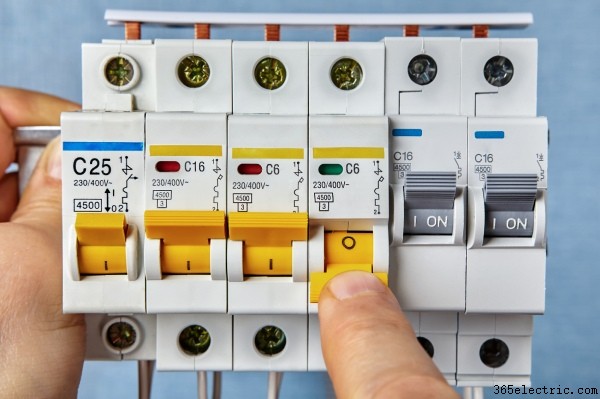
In limited cases, we also see that homeowners have installed a circuit breaker that is just too small. Example: A 3-ton AC unit on 220V has a max. wattage of about 3,600 watts and requires a 25A or 30A breaker. You can check what size AC breaker you need here accounting for NEC 80% ampacity rule.
Dead giveaways of a bad breaker are:
- Breaker smells like something is burning.
- Breaker is hot to the touch.
- Breaker keeps tripping all the time.
Solution: First, you need to check if you have a bad breaker. Secondly, check if the breaker is loose; try to nudge it from left to right to set it back in the required position. Of course, you will also have to check the above article if indeed your breaker is big enough to handle all the amps that you need to run your AC unit.
If you have a bad breaker, you just simply replace it. Get a new one – circuit breakers are quite inexpensive – and be sure to check that it has the same ampacity as the old one. Everybody can DIY breaker replacement; you can consult this guide on how to replace a circuit breaker if you need some help.
Once you have a working breaker again, your AC should stop tripping it.
#2 Wrong AC Wiring (New Air Conditioners Trip Breaker Immediately)
Another possibility, especially for new air conditioners, is wrong wiring. If you have a newly wired thermostat or you have just replaced an old thermostat, chances are that not all wires are connected to the right sockets.
For air conditioners, you will have to connect:
- Blue or yellow wire is meant for cooling. These wires are connected to the Y terminal in a standard thermostat.
- Red fire for power, connected to R.
- Common wire (usually black) connected to C.
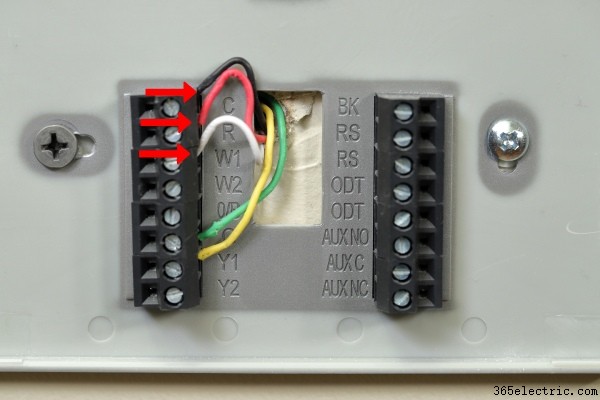
For more advice on how to wire a thermostat, you can consult the thermostat wiring guide here.
Wrong wiring will lead to the outside AC unit tripping breaker immediately (central aircon or mini splits). This is a standard AC compressor tripping issue; the compressor creates a surge of amps that can hit an undersized breaker if it’s wrongly wired.
Solution: Check that all the wires are in the right sockets. In limited cases, you will have to can an electrician to fix this, but most people can use the guide cited above to adequately wire a thermostat themselves.
#3 Electrical Short Circuit (Unsheathed Wires Touching)
Any short circuit can cause a spike in electrical current (amps) that will trip the breaker. In fact, one of the reasons why we use circuit breakers in the first place is to protect our circuits against short circuits.
In the case of wiring air conditioners, the short circuit happens when two exposed wired (unsheathed because the coating has been degrading for years) touch.
Example: Let’s say that the blue and red wire touch. This doesn’t happen if they are properly insulated. However, over time, insulation can decay. When this happens, the electrical current from two wires will travel along a single wire (the one with the least electric resistance, according to Ohm’s law). This will cause a spike in amps that can knock out the breaker.
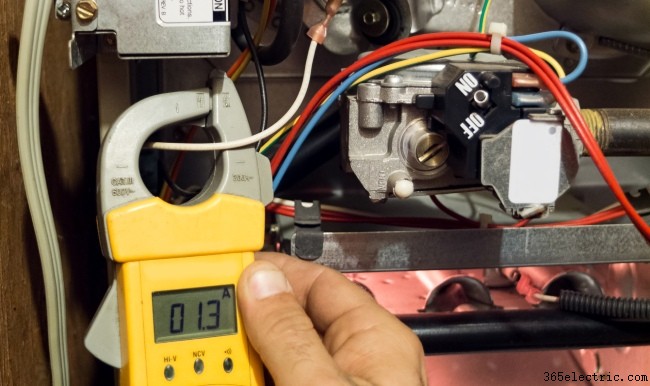
Admittedly, it’s very difficult to tell if you are experiencing a short circuit. You do have to go to check all the wires to see if the insulation is damaged. This short circuit problem also causes the AC to trip break immediately, after 5 minutes, or even after 10 hours of running the AC unit. It is not time-specific which makes the detection even harder.
Solution: If you suspect that your AC unit tripping the breaker due to a short circuit, you can check the wires yourself or call an electrician. Once you find faulty wires that are causing the short circuit, you have to reapply the coating, or, in more cases, just replace the wire.
All of this, of course, is easier said than done.
Once you have eliminated the thermostat-related problems, you can start checking if there is something wrong with your air conditioner unit, resulting in the breaker tripping repeatedly:
#4 Dirty Condenser Coils (Causing Outside Air Conditioner Circuit Breaker To Trip)
A lot of AC tripping breaker problems are caused by the air conditioner overheating. One of the most common examples of this is the air conditioner circuit breakers outside to trip.
The outdoor condenser coils are exposed to the environment. That means that anything from dirt, leaves, dust, and grass, can find its way into the AC outdoor unit (you may even find a dead rat in there) . If this dirt accumulates on the fairly exposed condenser coils, you will have problems with the outdoor AC unit tripping breaker.
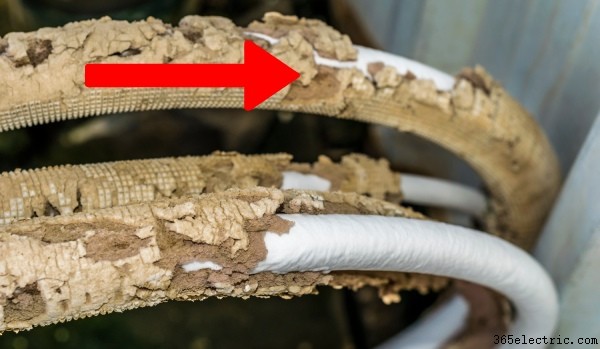
These condenser coils are basically superb heat exchangers . They expel all the heat that is generated in the refrigeration cycle. If these condenser coils are coated with dirt, for example, their ability to conduct heat is impeded. Obviously, if the coils can’t give away enough heat, the whole outdoor unit will get overheated.
And overheating leads to the AC tripping the breaker.
In this case, the AC breaker won’t turn trip immediately. It won’t even trip in 5 minutes or so. Dirty condenser coils are one of the most common reasons why the AC trips breaker after a few hours. The AC will overheat in time and that can take anywhere from some 10 minutes to several hours.
Solution: Clean the outdoor condenser coils. Open the outdoor unit and check if there is dirt coating on the coils. If there is, clean out the debris and spray them with detergent or coil cleaners. You can read how to clean the condenser coils on the Carrier website here.
After the outdoor coils are cleaned, they can adequately exchange heat again. That means that all the heat that has to be expelled via the coils will be released into the atmosphere again. As a result of the AC unit not overheating, you will no longer have a problem with AC breaker tripping.
#5 Dirty Air Filters (Restricted Airflow Results In Overheating And Trips Breaker)
Dirty air filters are another common culprit for an AC unit to trip breaker after a few hours.
We all know that every AC should have adequate airflow. If the filters are dirty, they restrict the airflow. This can cause a series of unwanted issues and will eventually lead to AC overheating. And, as we know, if the AC is overheating, it will inevitably trip a circuit breaker.
Everybody pretty much knows what to do with dirty air filters, right?
Solution: Clean or replace the air filters. This will again enable the AC unit to operate at sufficient airflow. The AC unit will not overheat. The AC breaker will not trip. It’s a pretty simple fix.
#6 Compressor Fails To Start (Or Hard-Starting Compressor)
Out of all the things that may go wrong, the compressor-related issues are the worst. When you have a faulty compressor, you will in almost all cases have to replace it. This replacement can be so costly that homeowners with older units usually just replace the whole air conditioning system.
Now, if you have a faulty compressor (the reason might also be a fault capacitor), you can expect two things to happen:
- Compressor doesn’t start at all. Regardless of this, the AC compressor can still trip the breaker. You will notice that in this case, the AC compressor trips the breaker immediately.
- Compressor starts slowly (usually takes a few seconds) . This is an indication of a faulty compressor and might lead to the AC compressor tripping the breaker after a few minutes.
The compressor – the main part of the AC – is responsible for compressing the refrigerant gas. If it doesn’t do its job, the AC unit might start overheating and blowing warm (instead of cold) air.
When the compressor doesn’t start at all, there is usually a spike in amps along the compressor wire to the breaker. This will trip the breaker immediately.
If you have a hard-starting compressor, the breaker won’t trip immediately. Nonetheless, such a compressor repeatedly can repeatedly send amp spikes towards the breaker in order to keep running. Eventually – usually in a few minutes or so – one of these amp spikes will overwhelm the circuit breaker and the breaker will flip.
Solution: This is a hard pill to swallow but you will probably have to replace the AC compressor. This is a complex replacement process you can’t do yourself; you will require an HVAC professional to do it for you.
You can, of course, take this ‘opportunity’ to replace the AC unit altogether. If your AC unit is past its prime (15+ years old), replacing the whole air conditioner makes sense in many cases.
#7 Compressor Is Grounded (Wires Touching The Sides)
Another problem a compressor might have – much less troublesome – is some wire displacements. Namely, the electrical wires that power the compressor are unsheathed and touching the compressor casing. It’s always best to check if everything is OK with the compressor wires.
Of course, if the wires touch the metal casing, all that electricity will go to the ground (we talk about the compressor being grounded). Inevitably, this will cause a spike in amps that will knock out the breaker.
Now, this may happen when you turn on the AC, after a few minutes, or even after several hours. The vibrations in the compressor pretty much displace one wire so much that it touches the casing, and that may happen immediately or even after some hours.
Solution: Check if all the wires that go in and out of the compressor still have their insulation coating on them. Also, check if the wires are neatly packed and away from the casing. If you find an exposed wire close to the casing, it’s very likely this is the wire that keeps tripping the AC breaker.
Use a plastic or nylon line to fix the wire in place, away from the casing. You can even replace that wire if you see that the insulation coating is severely damaged. After you do that, your breaker should stop tripping.
#8 Low Refrigerant Levels (Lines Leaking Freon)
All air conditioners work based on the refrigerant cycle. For this cycle to work properly, the lines have to be full of freon (refrigerant gas like R22, R410A, and so on). If you have a leak in the refrigerant lines, there will be less refrigerant within the lines which will lead to AC overheating and potentially tripping the breaker.
Example: If your window AC keeps tripping the breaker, the refrigerant leak could be the culprit.
Solution: You have to check if the refrigerant levels are indeed low by measuring the refrigerant pressure. If freon is indeed leaking out, you will first have to seal the leak and then recharge the AC unit.
In most cases, you will need professional help for this.
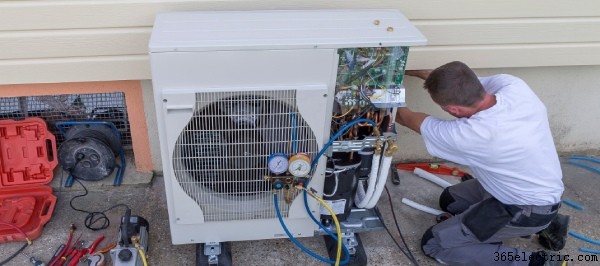
If you want to know how a professional refills the freon, you can consult this article about how to recharge a window air conditioner.
#9 Faulty Fan Motor (Leading To Overheating And Breaker Tripping)
In limited cases, we also see that a faulty fan motor is responsible for the outdoor AC unit tripping a breaker after a few hours.
The outdoor fan produces airflow that expels the heat into the environment (cooling the condenser coils). That fan is powered by the motor. If the motor doesn’t produce adequate power output, the fan doesn’t produce adequate airflow, and the outdoor AC cooling process is impeded.
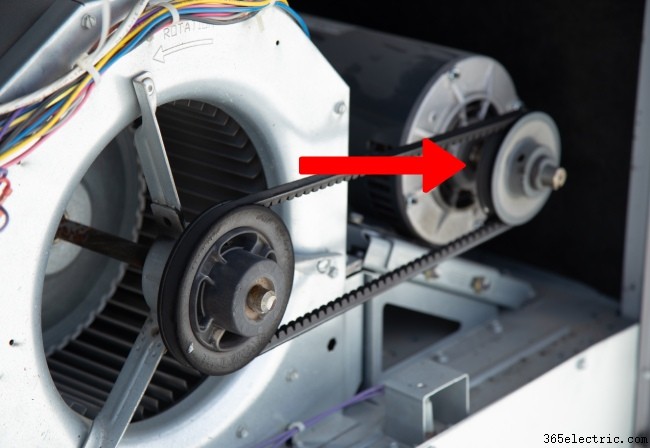
This can lead to AC overheating and tripping the AC breaker. This happens when the AC is overheated enough; it takes a few hours (not on start-up or after a few minutes).
Solution: Check if the outdoor fan is spinning. If not, the problem might be a faulty fan motor. You will probably need to replace it. Before you do that, do check out all the reasons why outdoor AC is not spinning here. Namely, a faulty fan motor is not the only reason why the condenser fan is not spinning.
After you fix this and the fan is spinning again, there won’t be overheating, and the outdoor AC unit will stop tripping the breaker.
How To Call If You Need Professional Help?
As we have seen, both the diagnosis of why the AC keeps tripping the breaker as well as the fixes are not a piece of the case.
From checking the breaker to checking if something is wrong with your AC unit, there is quite a lot of knowledge (and experience) that guys fixing AC units should have.
This article was a general overview of the causes for AC to keep tripping the breaker. If, however, you realize you will a professional help, you can turn to your local HVAC companies.
If you need some help on how to find good HVAC professionals, you can use this form here and get free quotes from up to 4 different HVAC companies in your area.
We hope this helps somebody figure out why the AC keeps tripping the breaker and how to go about fixing it by themselves or with professional help.
Thank you.
